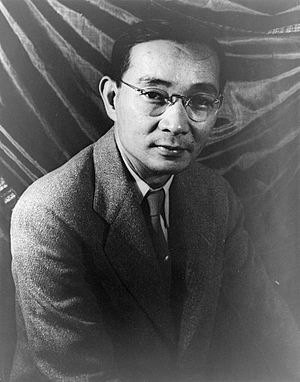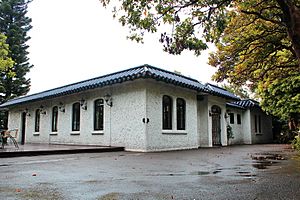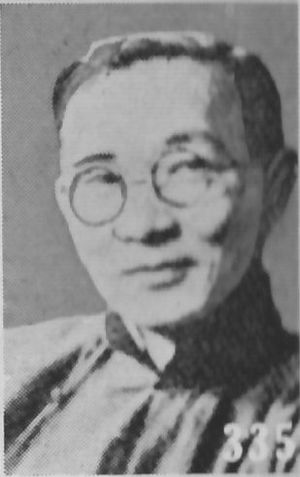Lin Yutang facts for kids
Quick facts for kids
Lin Yutang
|
|
|---|---|
| 林語堂 | |

Lin Yutang, photographed by
Carl Van Vechten, 1939 |
|
| Born | October 10, 1895 Banzai, Pinghe, Zhangzhou, Fujian
|
| Died | March 26, 1976 (aged 80) |
| Alma mater | Saint John's University Harvard University Leipzig University |
| Occupation | Linguist, novelist, philosopher, translator |
| Lin Yutang | |||||||||||||||||||
|---|---|---|---|---|---|---|---|---|---|---|---|---|---|---|---|---|---|---|---|
| Traditional Chinese | 林語堂 | ||||||||||||||||||
| Simplified Chinese | 林语堂 | ||||||||||||||||||
| Hokkien POJ | Lîm Gí-tông | ||||||||||||||||||
|
|||||||||||||||||||
Lin Yutang (Chinese: 林語堂; October 10, 1895 – March 26, 1976) was a famous Chinese inventor, writer, and thinker. He was known for his easy-to-read style in both Chinese and English. He also translated many important Chinese books into English. Some of his writings even spoke out against unfair treatment and control by Western countries.
Contents
Early Life and Education
Lin Yutang was born in 1895 in a town called Banzai in Fujian, China. His father was a Christian minister. Lin wrote a book later in life called From Pagan to Christian (1959). In this book, he shared his spiritual journey. He explored different beliefs like Taoism and Buddhism before returning to Christianity.
He went to Saint John's University in Shanghai for his first degree. After that, he received a scholarship to study for his doctorate at Harvard University in the United States. He loved learning there, especially in the big Widener Library.
Because of money problems, he left Harvard early. He moved to France to work with the Chinese Labour Corps. Later, he went to Germany. There, he finished his studies and earned his doctorate in Chinese language and literature at the University of Leipzig.
Teaching and Writing in China
From 1923 to 1926, Lin Yutang taught English literature at Peking University. He was excited about the changes happening in China. He briefly worked for the new Nationalist government. However, he soon decided to focus on teaching and writing instead.
Lin lived during a time called the New Culture Movement. This movement questioned old Chinese traditions. But Lin chose to study classic Chinese writings, like those by Confucius. These were things his Christian upbringing and English education had not focused on.
He started a humor magazine called The Analects Fortnightly. It was published from 1932 to 1940 and again from 1945 to 1949. Famous writers like Lu Xun wrote for his magazine. Lin helped introduce the idea of "humor" to China. In 1924, the Chinese word yōumò (幽默) was created. It sounded like the English word "humor." Lin believed humor showed a kind, open-minded, and wise way of life.
Lin's Chinese writings sometimes criticized the Nationalist government. This made him worry about his safety. Many of these essays were later put into a book called With Love and Irony (1940). In 1933, he met Pearl Buck, a famous American writer. She helped introduce his work to her publisher in the United States.
Lin's feelings about Christianity changed over time. His father was a Christian, but Lin wondered what it meant to be Christian in China. He felt that being Christian sometimes meant losing touch with Chinese culture. After studying abroad, he respected his father more. Yet, he spent time learning about Confucianism, Taoism, and Buddhism. He did not call himself a Christian again until the late 1950s.
Life and Work Abroad

After 1935, Lin Yutang mostly lived in the United States. There, he became a well-known writer about Chinese philosophy and way of life. He wrote popular books in English like My Country and My People (1935) and The Importance of Living (1937). These books helped Western readers understand China better.
He also wrote novels, including Moment in Peking (1939) and A Leaf in the Storm (1940). These stories showed China during difficult times. His book Chinatown Family (1948) was about Chinese Americans living in New York.
Lin also wrote about politics. His book Between Tears and Laughter (1943) criticized Western racism and control over other countries. After the attack on Pearl Harbor, he visited China. He wrote positively about China's war efforts in Vigil of a Nation (1944).
Lin was very interested in machines. Chinese writing uses thousands of characters, not an alphabet. This made modern printing difficult. Lin worked for many years to create a working Chinese typewriter. He finally brought it to market during the war with Japan. His Mingkwai "Clear and Quick" typewriter was very important for language research.
From 1954 to 1955, Lin briefly served as the president of Nanyang University in Singapore. This university was new and aimed to teach Chinese studies. However, Lin had disagreements with the university's founder and board. He wanted to make big changes, but they did not agree. Lin eventually left the university.
After returning to New York in the late 1950s, Lin became interested in Christianity again. His wife was a very religious person. He admired her peacefulness and kindness. After going to church with her for several months, he joined the church. His 1959 book From Pagan to Christian explained why he returned to his faith.
Lin was very good at both Chinese and English. He led the creation of a large dictionary called Lin Yutang's Chinese-English Dictionary of Modern Usage (1972). This dictionary helped people understand Chinese words using English. He worked on this project at the new Chinese University of Hong Kong.
Lin Yutang's work helped connect the cultures of the East and the West. He continued to work until he passed away in 1976. He was buried at his home in Yangmingshan, Taipei, Taiwan. His home is now a museum. His childhood home in Banzai, China, is also a museum.
Legacy and Impact
Even though his main books are still available, Lin Yutang's importance in modern Chinese thought has sometimes been overlooked. Conferences have been held in Taiwan and his home province of Fujian to celebrate his work. In 2011, a big conference was held in Hong Kong. Scholars from many countries discussed Lin Yutang's influence across cultures.
The first full study of Lin Yutang in English was a doctoral paper by Diran John Sohigian in 1991. Another book, Sound and Script in Chinese Diaspora (2010) by Jing Tsu, talks about Lin Yutang's work on Chinese writing and typewriters. It also explains how his work helped with early machine translation research.
Family Life
Lin Yutang's wife was Liao Tsui-feng (Chinese: 廖翠鳳). She was also a writer. With their daughter Lin Hsiang Ju, she wrote three cookbooks. These books helped make Chinese cuisine popular in English-speaking countries. Dr. Lin wrote introductions for these books, explaining the history and how they related to American life.
His first daughter, Adet Lin Feng-ju (Chinese: 林鳳如; 1923–1971), was a Chinese-American writer. She used the pen name Tan Yun.
His second daughter, Lin Taiyi (Chinese: 林太乙; 1926–2003), was also a writer. She was the editor-in-chief of the Chinese version of Reader's Digest for many years. She also wrote a book about her father in Chinese.
His third daughter, Lin Hsiang-ju (Chinese: 林相如; born 1931), was called Meimei as a child. She helped her mother write cookbooks. She also became the head of the Department of Pathology at the University of Hong Kong.
Works
You can find many of Lin Yutang's works online for free at the Internet Archive HERE.
Books in Chinese
- (1928) Jian Fu Collection
- (1930) Letters of a Chinese Amazon and War-Time Essays
- (1933) A Collection of Essays on Linguistics
- (1935) The Little Critic: Essays Satires and Sketches on China (First and Second Series)
Books in English
- (1935) My Country and My People
- (1937) The Importance of Living
- (1939) Moment in Peking
- (1942) The Wisdom of China and India
- (1947) The Gay Genius: The Life and Times of Su Tungpo
- (1948) Chinatown Family
- (1959) From Pagan to Christian
- (1972) Chinese-English Dictionary of Modern Usage
See also
 In Spanish: Lin Yutang para niños
In Spanish: Lin Yutang para niños
Portrait
- Lin Yutang. A Portrait by Kong Kai Ming at Portrait Gallery of Chinese Writers (Hong Kong Baptist University Library).
 | Selma Burke |
 | Pauline Powell Burns |
 | Frederick J. Brown |
 | Robert Blackburn |


